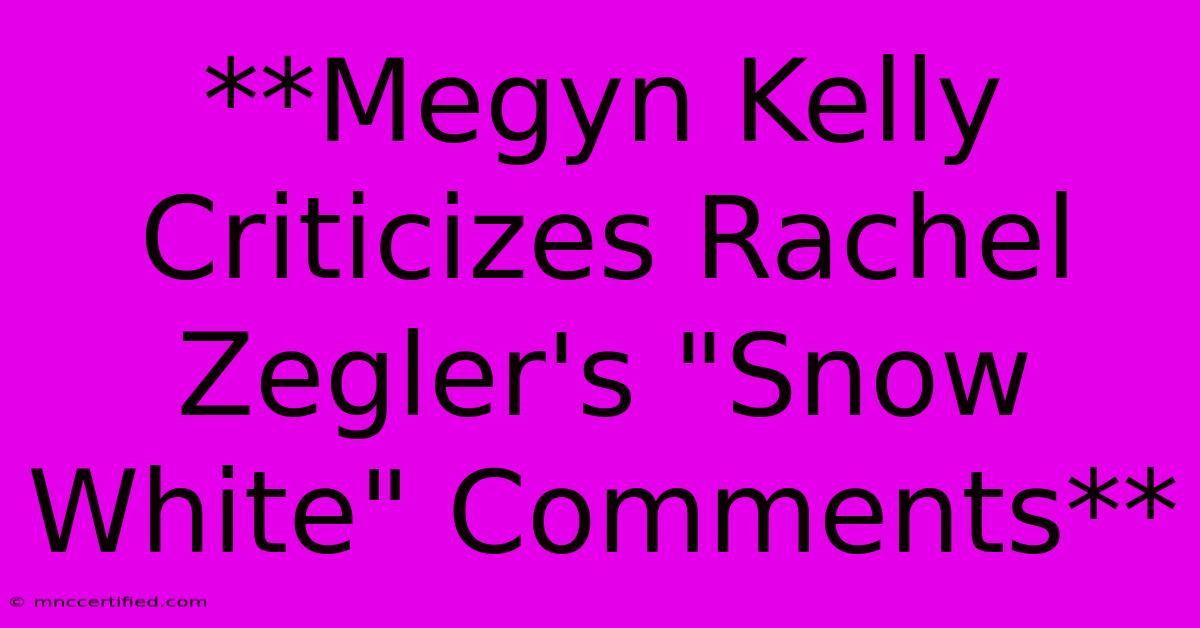**Megyn Kelly Criticizes Rachel Zegler's "Snow White" Comments**

Table of Contents
Megyn Kelly Criticizes Rachel Zegler's "Snow White" Comments: A Deeper Dive into the Controversy
The casting of Rachel Zegler as Snow White in Disney's live-action remake has sparked considerable debate, but a recent critique from Megyn Kelly ignited a fresh wave of controversy. Kelly's comments on Zegler's remarks regarding the character's portrayal have fueled a heated online discussion about race, representation, and the evolving expectations of classic fairytale adaptations. This article delves into the specifics of the situation, examining both sides of the argument and exploring the broader implications of the controversy.
The Genesis of the Controversy: Zegler's Original Remarks
Rachel Zegler, known for her role in West Side Story, initially generated discussion with her comments about the character of Snow White. She emphasized a departure from the traditionally passive portrayal, describing the character in the upcoming film as "not going to be waiting around for a prince." Zegler highlighted a more proactive and independent Snow White, a modern interpretation that resonates with contemporary audiences. However, this proactive stance, intended to modernize the classic fairytale, became a point of contention for some.
Megyn Kelly's Critique: Fueling the Fire
Megyn Kelly, a prominent media personality, responded to Zegler's comments with a critique that quickly went viral. Kelly's statement, which questioned the changes to the character and expressed a traditionalist viewpoint, reignited the existing debate and brought it into sharper focus. Her perspective highlighted a clash between those who favor updating classic narratives to reflect modern values and those who believe in preserving the original essence of the stories.
The Heart of the Disagreement: Modernization vs. Tradition
The core issue revolves around the tension between honoring the original source material and adapting it for a modern audience. Zegler's comments represent a push for inclusivity and a more empowering representation of female characters. Conversely, Kelly's critique, and those who share her viewpoint, emphasize preserving the traditional elements of the fairytale, arguing that alterations risk diminishing the iconic nature of Snow White.
This fundamental disagreement reflects a larger cultural shift in how we perceive and interpret classic stories. The debate extends beyond just Snow White; it encompasses the broader conversation about representation, diversity, and the role of storytelling in shaping societal values.
Analyzing the Backlash: Social Media and Public Opinion
The controversy surrounding Kelly's critique quickly escalated on social media, with a significant portion of the online discourse criticizing Kelly's perspective. Many viewed her remarks as dismissive of Zegler's efforts to portray a more progressive version of Snow White and as an attempt to discredit a young actress's valid interpretation. The ensuing discussion highlighted the importance of open dialogue on representation and the potential pitfalls of dismissing attempts at modernizing classic narratives.
Beyond the Personalities: A Broader Discussion
While the focus often falls on the personalities involved, the controversy provides a valuable opportunity to examine broader issues. It prompts a discussion about:
- Representation in media: How do we balance preserving classic stories with ensuring inclusive and diverse representation?
- Modern interpretations of fairytales: What is the appropriate level of adaptation for classic stories to remain relevant?
- The impact of social media: How does social media amplify and shape public discourse surrounding such controversies?
Conclusion: Navigating the Shifting Sands of Fairytale Adaptations
The controversy surrounding Megyn Kelly's criticism of Rachel Zegler's comments on the new Snow White adaptation underscores the complexities of reimagining classic stories for modern audiences. The debate highlights the ongoing tension between preserving tradition and embracing change, raising crucial questions about representation, diversity, and the evolving expectations surrounding fairytale interpretations. While the individual perspectives of Kelly and Zegler are important, the broader conversation sparked by their disagreement offers a vital opportunity for reflection on the evolving landscape of storytelling and the crucial role of adapting classic narratives for a modern world. The discussion, though heated, is vital for understanding the evolving expectations for both filmmakers and audiences.

Thank you for visiting our website wich cover about **Megyn Kelly Criticizes Rachel Zegler's "Snow White" Comments**. We hope the information provided has been useful to you. Feel free to contact us if you have any questions or need further assistance. See you next time and dont miss to bookmark.
Featured Posts
-
Where To Buy Fabric Bonding Powder
Nov 15, 2024
-
Jamaica Vs Usa Live Stream And Tv Guide
Nov 15, 2024
-
Trump Appoints Rfk Jr To Lead Hhs
Nov 15, 2024
-
Alex Jones Outraged The Onion Buys Infowars
Nov 15, 2024
-
Venezuela Vs Brazil 2026 Fifa World Cup Qualifiers Live
Nov 15, 2024